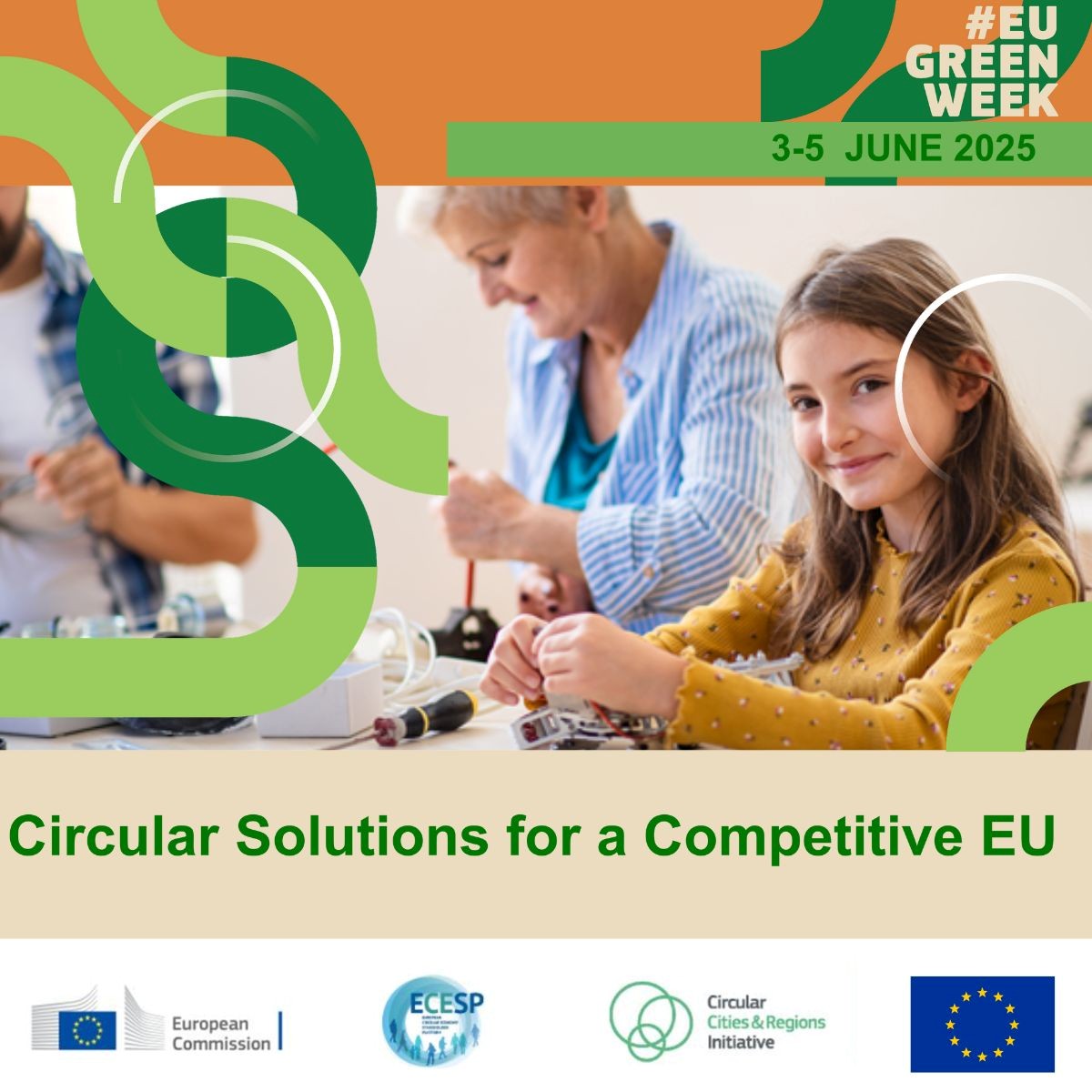
Brussels, June 3–5 – The 2025 edition of the EU Green Week, held in Brussels from June 3 to 5, focused on one of the most pressing challenges of our time: the transition to a circular economy. With a wide array of policymakers, scientists, business leaders, and civil society participants, the event underscored the urgent need to integrate circular practices into the European economy—not just as an environmental imperative but as a pathway to economic innovation and competitiveness.
Day One: A Call for Circular Transformation
Moderated by journalist Katrina Sichel, the opening day of the convention began by setting the tone: the time needed to recycle plastic remains uncertain, only 12% of material resources in the EU were circular in 2023, and yet the potential is immense.
The core message was clear: the European Union must make the circular economy its default model. Collaboration with economic and social bodies, particularly the European Economic and Social Committee (EESC), was emphasized as crucial to achieving this goal.
Anita Sowińska, Undersecretary of State in Poland’s Ministry of Climate and Environment, and Oliver Röpke, President of the EESC, were among the day’s keynote speakers. They highlighted the significance of managing Europe’s 60 million tons of bio-waste and distinguishing between two critical material streams—technological and biological. A failure to separate these effectively could result in the degradation of biological resources essential for healthy soils.
Röpke also presented EESC proposals aimed at creating a coherent framework for circularity across all sectors, stressing that without solid economic incentives, environmental transition would remain out of reach.
Day Two: Citizens and Industries at the Heart of Circular Change
The second day spotlighted how circular principles can be integrated into the lives of citizens and industries. The emphasis was on promoting circular products through incentives, rather than relying on penalties for linear models. The public and private sectors must work hand in hand to encourage innovation in sustainable design and reuse.
Discussions focused on how citizens are both beneficiaries and actors in this transition. Education, consumer awareness, and product labelling were seen as fundamental tools to empower individuals. Meanwhile, companies called for clearer legislation and financing mechanisms that could help them shift toward sustainable production without facing market disadvantages.
Day Three: Local Implementation and Global Vision
The final day of Green Week 2025 highlighted implementation efforts at regional and local levels, with special focus on stakeholder collaboration and regulatory adaptation. The European Circular Economy Stakeholder Platform (ECESP) held a pivotal session where topics such as social capital, co-creation, and the role of municipalities were addressed. The need for adaptable yet structured EU-wide regulation was a recurring point.
The day opened with a keynote address by Dr John Bell, “Healthy Planet” Director at the Directorate-General for Research and Innovation, European Commission. His intervention set the tone for the day by highlighting the importance of integrating science and research into the circular economy transition.
Bell introduced the day’s focus on bio-economy and local implementation by stressing the value of EU-funded research projects in advancing sustainability goals. Notably, he cited P2GreeN as a concrete example of how European research is enabling circular solutions with direct environmental and social impact. His remarks underscored the critical role of collaborative, cross-border projects in creating a truly resilient and sustainable European economy.
Among the standout contributions was that of Anita Beblek, representing the P2GreeN Project, which focuses on transforming waste into value through sustainable circular practices. She outlined several key challenges, including:
- Lack of coherent pricing models and insufficient incentives;
- Regulatory frameworks that hinder rather than help circular initiatives;
- Absence of legal provisions for the sale of bio-fertilizers.
Despite these obstacles, the P2GreeN Project has had a positive environmental impact and has driven technological improvements, such as advocating for the revision of fertilizer regulations across different European nations. Beblek stressed that the main risks are not rooted in project design, but in the EU’s current regulatory gaps, which must be addressed if circular bio economy initiatives are to flourish.
Other speakers in the session included Emma Pipó Ollé (BIOBOOST, ), Magdalena Edvardsen (TREASoURcE), Sergio Ponsá Salas (UVIC-UCC), and Laurent Bleuze (La Coopération Agricole). Each presented unique examples of how circularity can take root—from wool processing and gas reutilization to resource mapping and regulatory innovation.
Despite the diversity of projects and contexts—from France to Hungary to Catalunia—a common thread emerged: a shared call for regulatory reform. Participants highlighted the need for clear definitions of bio-economy and bio-waste, better financial support, and pan-European cooperation. As the convention closed, a shared sense of responsibility—and possibility—prevailed. Making the circular economy the standard, not the exception, will require courage, coordination, and long-term vision. But the message from Brussels was clear: the time for incremental steps has passed. It’s time for bold, systemic change.
For more information about Green Week 2025: